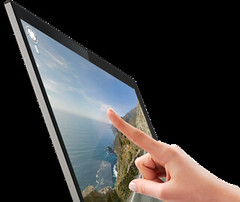| Chromebook Pixel (Photo credit: Stratageme.com) |
If you happen to already be a Linux enthusiast, then likely you have been following any and all developments around the growth of Google's Chromebook with great interest.
Unlike Canonical's Ubuntu Linux, Google have succeeded, on a broad scale, in getting shelf space in the U.S. and Canadian retail 'brick and mortar' setting.
And, as witnessed over the past year, 2012, we have seen a series of OEMs making their first Chromebook SKUs. Samsung (now with several), Acer, Lenovo, and most recently Hewlett Packard all have entered the ring. It's a vote of 'confidence' for Chromebook in several respects:
- OEM certifiability and low return rates
- User Ease of Use, broad market segment appeal
- A system which is hard to break
- A system which is exceptionally secure (more so than either Windows or OS X)
- Low-cost price point barrier to entry for Consumers and Businesses alike
That last category has been up to this point one of the biggest selling points for Chromebooks in addition to their ease of use and security reputation.
So, with the Chromebook's average price point in the $200-$500 range, why is Google now selling a high-end $1500 touchscreen-enabled Chromebook?
That has been my question and immediate reaction to the Pixel.
As nice as it may be, it simply runs counter to the prevailing reputation and strong selling point of Chromebooks--low cost.
Honestly, I don't see many of these units selling, other than to a small set of elite technophiles.
And, those who talk about switching the developer-mode switch and installing another Linux Distro are missing the point of the Chromebook. If Google wants to, they can build any kind of Linux Boxen. Doing anything to change the characteristics of the Chromebook defeats its purpose.
For all intents and purposes, is the Chromebook an 'Internet Appliance'?
I think that term is accurate when applied to the low-end Chromebooks:
When a person can pick up a device, use it on demand, with relative ease and little thought, and little can go wrong, you have the essentials for a durable product which will become appliance-like--much like the Telephone, Microwave, and Television have become in our lives. We accept them. We use appliances matter of factly and don't give it a thought.
So, where does the newest Google-branded Pixel Chromebook fit in? Is it a technical marvel, or, is it an oddity?
I say, it's an Oddity. What say you?
-- Dietrich



















I agree totally, I can't understand why Google have chosen to release this device. Yes it's beautiful and yes the screen is superb but it seems to go against the whole mantra of the Chromebook - that it is a small device to get you on to the internet quickly to get you doing what you need to do.
ReplyDeleteI simply can't see the justification for such a device running what is basically a glorified browser, it just doesn't make sense for me. The original Chromebooks are ground breaking devices that fill a definite niche in the market. But the Pixel to me is a Frankenstein of a "traditional" Chromebook and a Macbook Air.
I would have considered one of these if it had more local storage. That way I can use it more like a traditional laptop, that would have at least gone towards justifying the price tag. But with just 32GB to play with I simply can't buy into this, I think this is Google's Vista.
I think it is true that companies 'rolling in cash' can afford to make product which doesn't sell. ;)
ReplyDelete